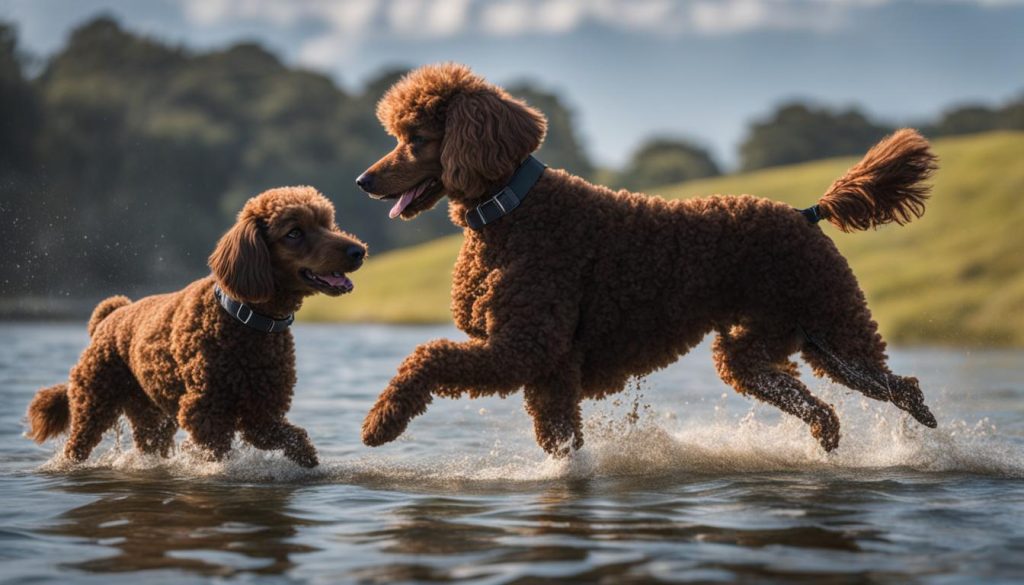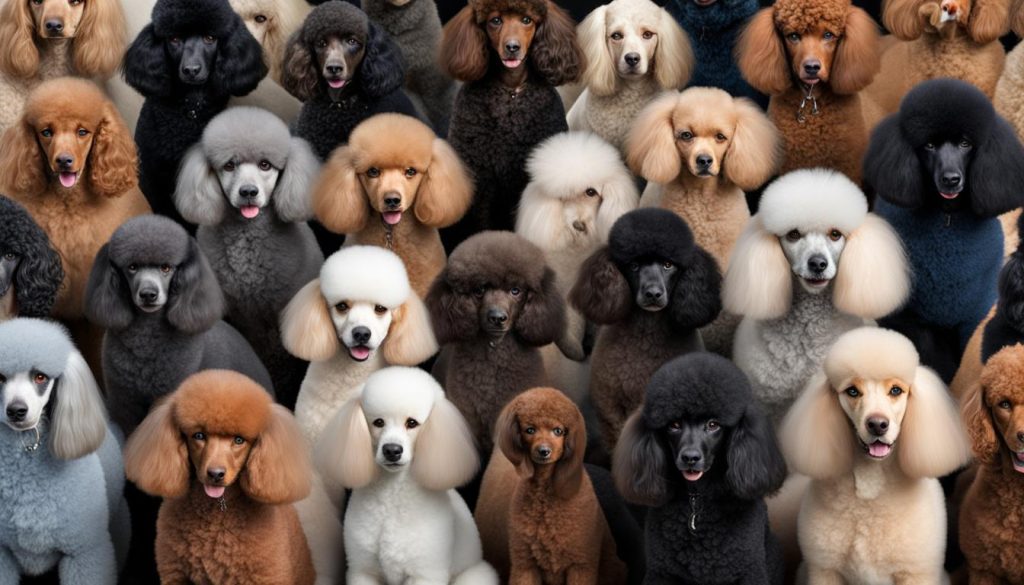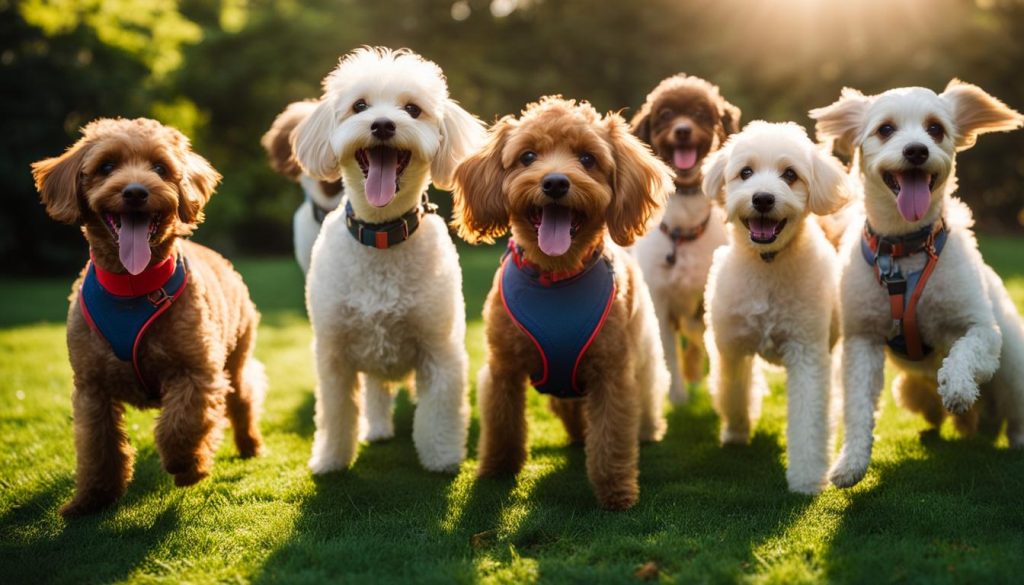Poodles are one of the world’s most popular dog breeds, known for their wonderful temperament, adorable appearance, and intelligence. They were originally bred as hunting dogs but are now commonly kept as family pets. Poodles come in three different sizes: Standard Poodle, Miniature Poodle, and Toy Poodle. The Standard Poodle is the largest, while the Toy Poodle is the smallest. Poodles have a distinctive curly coat which comes in a wide variety of colors. They are hypoallergenic and require regular grooming to maintain their coat.
Key Takeaways:
- There are three different sizes of Poodles: Standard, Miniature, and Toy.
- Poodles have a curly coat that comes in various colors.
- Poodles are hypoallergenic and need regular grooming.
- They were originally bred as hunting dogs.
- Poodles are known for their intelligence and friendly temperament.
The History and Origin of Poodles
Poodles have a rich history that spans centuries and has its roots in both Germany and France. The exact origins of the breed are a subject of debate, as there are differing theories about their true ancestry. However, it is widely accepted that Poodles originated in Germany in the 1600s and were initially bred as water retrievers. They were called “Pudel” or “Pudelin” in German, which translates to “splash in the water,” reflecting their skill and purpose as hunting dogs.
In the 18th century, Poodles were introduced to France and quickly gained popularity among the French nobility. In France, they became known as “Caniche,” derived from the word “canard,” which means “duck” in French. They were admired for their elegant appearance, intelligence, and versatility. French aristocrats often kept Poodles as companion dogs and also trained them as performers in circuses and for truffle hunting.
Despite the French association with the breed, the debate about the true origin of Poodles continues. Some argue that Poodles were actually developed in France and then exported to Germany, while others maintain that they originated in Germany and the French simply refined the breed. Regardless of their precise origins, Poodles have become beloved and recognized worldwide for their intelligence, agility, and lovable nature.
“Poodles have a fascinating history, with their roots in both Germany and France. Whether they were first bred in Germany or France, one thing is certain – their intelligence, versatility, and playful personalities have captivated dog lovers across the globe.” – Poodle enthusiast
| German Origin | French Origin |
|---|---|
| Pudel in German | Caniche in French |
| Bred as water retrievers | Popular among French nobility |
| Exported to France | Trained as circus dogs and truffle hunters |

- Poodles originated in Germany during the 1600s.
- They were bred as water retrievers and called “Pudel” in German.
- Poodles were later exported to France, where they became known as “Caniche.”
- They were popular among French nobility and were trained for various tasks.
- The true origin of Poodles is still a subject of debate between Germany and France.
Physical Appearance of Poodles
Poodles have a distinctive appearance that sets them apart from other breeds. Their deep chest, long legs, and elegant posture give them a regal and graceful presence. However, it is their unique coat that truly captures attention. Poodles have a thick, curly coat that comes in a variety of colors, making them quite striking.
Their coats can be black, brown, apricot, red, white, silver, cream, blue, or even parti-colored. The texture of their fur is soft and woolly, creating a distinct curly or corded appearance. This curly coat serves a purpose beyond aesthetics; it helps protect the Poodle from the cold and wet weather, as they were originally bred as water retrieving dogs.
While the appearance of the Poodle may vary in terms of size, with Standard Poodles being the largest, Miniature Poodles being medium-sized, and Toy Poodles being the smallest, all sizes share the same proportions and body structure. Their long, slim legs, deep chest, and well-balanced frame give them a graceful and athletic appearance.
Grooming
One of the most well-known aspects of Poodle appearance is their grooming needs. Poodles require regular grooming to maintain the health and beauty of their coat. This includes frequent brushing to prevent matting and regular visits to a professional groomer for haircuts and trimming.
Their curly coat can become easily tangled and matted, so daily brushing is recommended to keep it in top condition. Regular grooming also helps remove loose hairs and prevent shedding, making Poodles a great choice for individuals with allergies.
Additionally, Poodles require routine cleaning of their ears to prevent infections, as their long, floppy ears can trap moisture and debris. Trimming their nails regularly is also important to avoid overgrowth and discomfort.

| Coat Colors | Description |
|---|---|
| Black | A solid black coat from roots to tips. |
| Apricot | A light, warm color resembling the flesh of an apricot. |
| Red | A rich, deep red hue. |
| White | A pure, bright white color. |
| Silver | A grayish color with a metallic sheen. |
| Cream | A light, creamy color. |
| Blue | A dark grayish-blue shade. |
| Parti-colored | A coat with two or more distinct colors, typically white and another solid color. |
Poodles have an unmistakable appearance with their curly coat and regal stance. Their wide range of coat colors adds to their beauty and uniqueness. Regular grooming is essential to maintain their coat’s health and prevent matting. Poodles are truly a breed that stands out from the crowd.
Temperament and Personality of Poodles
Poodles are renowned for their exceptional temperament and intelligence. They are widely regarded as one of the most intelligent dog breeds, ranking second only to the Border Collie. Poodles are quick learners and excel in training, making them highly trainable companions. Their intelligence also enables them to pick up new commands and tricks with ease.
When it comes to temperament, Poodles are known for being friendly, adaptable, and social. They are typically affectionate and enjoy spending time with their owners and other family members. Poodles are often described as people-oriented dogs and strive to be an integral part of their human companions’ lives. They form strong bonds and thrive in homes where they receive plenty of attention, love, and mental stimulation.
In addition to their social nature, Poodles are also known for their playful and active personalities. They have a moderate to high energy level and require regular exercise to keep them physically and mentally stimulated. Daily walks, playtime, and interactive toys are essential to prevent boredom and ensure a happy and contented Poodle. Their love for play extends to both outdoor activities and interactive indoor games.
Understanding Poodle Activity Levels
While all Poodles share similar traits in terms of temperament and intelligence, there can be slight variations in behavior based on their size. Standard Poodles, being the largest of the three size variations, tend to have a slightly lower activity level compared to Miniature and Toy Poodles. However, each individual Poodle’s activity level will also depend on factors such as age, health, and overall personality.
| Poodle Size | Activity Level |
|---|---|
| Standard Poodle | Moderate |
| Miniature Poodle | Moderate to High |
| Toy Poodle | High |
It’s important for potential owners to consider their own lifestyle and activity level when choosing a Poodle. If you lead an active lifestyle and enjoy outdoor activities, a Miniature or Toy Poodle may be the perfect fit. On the other hand, if you prefer a more laid-back companion, a Standard Poodle may be a better choice. Regardless of size, Poodles thrive when given regular exercise, mental stimulation, and social interaction.

Overall, the temperament and personality of Poodles make them excellent family pets and companions. Their intelligence, trainability, adaptability, and friendly nature contribute to their popularity and make them a joy to have as part of the family. Whether you’re looking for an active playmate or a loyal lap dog, Poodles have the qualities that make them a beloved breed for households of all sizes and lifestyles.
Health and Care of Poodles
Poodles are generally a healthy breed with a lifespan of 14 to 18 years. However, they can be prone to certain health issues that owners should be aware of. Regular veterinary check-ups and proper care can help ensure the well-being of your beloved Poodle.
Grooming
Grooming is an essential part of caring for a Poodle. Their curly coat requires regular brushing to prevent matting and maintain its appearance. Many Poodle owners choose to have their dogs professionally groomed every 4 to 6 weeks. Grooming sessions may include bathing, hair trimming, nail trimming, and cleaning the ears.
Ear Infections
Poodles are prone to ear infections due to their floppy ears and a buildup of moisture. You should regularly clean your Poodle’s ears and check for any signs of infection, such as redness, discharge, or a foul odor. If you notice any of these symptoms, consult your veterinarian for proper treatment.
Genetic Diseases
Like many purebred dogs, Poodles can be prone to certain genetic diseases. Responsible breeders perform health tests to detect and minimize the risk of passing on these conditions to puppies. Common genetic diseases include eye problems, hip dysplasia, adrenal gland issues, epilepsy, and certain cancers. When getting a Poodle, you should research reputable breeders who prioritize the health and well-being of their dogs.
| Health Issue | Prevalence | Symptoms | Treatment |
|---|---|---|---|
| Eye problems | Common | Redness, discharge, vision changes | Medication, surgical intervention |
| Hip dysplasia | Common | Lameness, difficulty in walking | Medication, joint supplements, surgery |
| Adrenal gland issues | Rare | Hormonal imbalance, hair loss | Medication, hormone replacement therapy |
| Epilepsy | Rare | Seizures, loss of consciousness | Medication, managing triggers |
| Certain cancers | Rare | Lumps, abnormal growths | Surgical removal, chemotherapy, radiation |
Poodle Cross Breeds
Poodles are not only beloved as purebred dogs but also sought after for their desirable traits when mixed with other breeds. The resulting crossbreeds, often referred to as “Oodle dogs,” are a popular choice for those looking for unique and hypoallergenic companions. One of the most well-known Poodle crossbreeds is the Labradoodle.
The Labradoodle is a mix between a Labrador Retriever and a Poodle. This crossbreed was intentionally bred in the 1980s to create a hypoallergenic guide dog. Labradoodles typically have a friendly temperament, intelligence, and a low-shedding coat, inheriting the Poodle’s hypoallergenic qualities.
There are many other Poodle crossbreeds available, each with its own distinct characteristics and appearances. These include popular mixes like the Goldendoodle (Golden Retriever + Poodle), Cockapoo (Cocker Spaniel + Poodle), and the Bernedoodle (Bernese Mountain Dog + Poodle). These crossbreeds often inherit the Poodle’s friendly and sociable nature, making them great family pets.

Benefits of Poodle Cross Breeds:
- Hypoallergenic: Poodle crossbreeds are often bred for their hypoallergenic coats, which produce fewer allergens, making them suitable for allergy sufferers.
- Friendly Temperament: Poodles are known for their friendly and sociable personalities, and these traits are often passed onto their crossbred offspring.
- Variety: Poodle crossbreeds come in a wide range of sizes, colors, and coat types, giving prospective owners plenty of options to choose from.
“Poodle crossbreeds are popular for their unique traits and hypoallergenic qualities, making them a top choice among dog enthusiasts.”
| Poodle Cross Breed | Main Breed Mix | Characteristics |
|---|---|---|
| Labradoodle | Labrador Retriever | Intelligent, friendly, low-shedding |
| Goldendoodle | Golden Retriever | Friendly, gentle, hypoallergenic |
| Cockapoo | Cocker Spaniel | Playful, social, low-shedding |
| Bernedoodle | Bernese Mountain Dog | Loyal, intelligent, hypoallergenic |
When considering a Poodle crossbreed, I would advise that you research each specific mix to understand their unique needs and characteristics. Don’t forget that individual dogs may vary in appearance and temperament, even within the same crossbreed. Finding a reputable breeder who health tests their breeding stock can help ensure a healthy and well-adjusted puppy.
Poodles as Pets
Poodles make wonderful pets and are known for being loving and loyal companions. As pet owners, consider their specific needs and provide them with the care and attention they require.

Diet
Feeding your Poodle a balanced and nutritious diet is crucial for their overall health and well-being. It’s recommended to choose high-quality dog food that is appropriate for their age, size, and activity level. Poodles have specific dietary needs, so consult with your veterinarian to determine the best diet plan for your furry friend.
Hypoallergenic and Grooming
Poodles are considered hypoallergenic, making them a great choice for individuals with allergies. Their curly coat does not shed much, but it requires regular grooming to prevent matting. Regular brushing, bathing, and professional grooming are necessary to keep their coat healthy and tangle-free.
Exercise and Mental Stimulation
Poodles are an active breed that requires regular exercise to keep them physically and mentally stimulated. Daily walks, playtime, and interactive toys can help fulfill their exercise needs and prevent boredom. Engaging their minds with training sessions or puzzle toys can also help keep them mentally sharp.
Therapy Dogs
Poodles are known for their friendly and comforting nature, which makes them well-suited as therapy dogs. Their intelligence and trainability make them excellent companions for individuals in hospitals, nursing homes, or other therapy settings. If you’re interested in training your Poodle as a therapy dog, consult with a professional trainer to ensure they meet the necessary requirements.
Royal Standard Poodles and Other Poodle Types
Poodles are a versatile breed that comes in different sizes, including Standard Poodle, Miniature Poodle, and Toy Poodle. However, there is also a larger variant known as Royal Standard Poodles. These dogs are selectively bred to be bigger than the average Standard Poodle, with some exceeding 27 inches in height. While Standard Poodles are already the largest recognized size according to kennel clubs, Royal Standard Poodles take size to another level.
The breed standards for Royal Standard Poodles are similar to that of Standard Poodles in terms of temperament, intelligence, and adaptability. The main distinguishing factor is their size. Due to their larger stature, Royal Standard Poodles require more space and exercise compared to their smaller counterparts. They are still known for their friendly and loving temperament, making them wonderful companions for families and individuals alike.
| Size | Height (at the shoulder) | Weight |
|---|---|---|
| Standard Poodle | Over 15 inches | 45-70 pounds |
| Royal Standard Poodle | 27 inches or more | 70-90 pounds |
| Miniature Poodle | 10-15 inches | 10-20 pounds |
| Toy Poodle | Less than 10 inches | 4-6 pounds |
Regardless of the size, Poodles are known for their intelligence, trainability, and hypoallergenic coat. They make great family pets and are often used as therapy dogs due to their friendly and comforting nature. Whether you choose a Standard Poodle, Miniature Poodle, Toy Poodle, or a Royal Standard Poodle, you can enjoy the loyal companionship and unique qualities that Poodles have to offer.

Notable Poodle Facts:
- Poodles are ranked as the 7th most intelligent dog breed.
- They require regular grooming to maintain their curly coat.
- Poodles are highly adaptable and can thrive in various living environments.
- Royal Standard Poodles are bred selectively for larger size and may have specific breeders specializing in them.
Small Poodle Mixes: The Perfect Companions
Small Poodle mixes, also known as designer dogs, have gained immense popularity among dog lovers. These adorable crossbreeds combine the best traits of Poodles with other breeds, resulting in unique and lovable companions. Some popular small Poodle mix breeds include the Cockapoo, Shih-Poo, and Maltipoo.

Each small Poodle mix has its own distinct traits that make them special. The Cockapoo, a cross between a Poodle and a Cocker Spaniel, is known for its playful and friendly nature. This mix is often adored for its wavy or curly coat, which requires regular grooming to keep it looking its best.
“The Cockapoo is a delightful companion, known for its intelligence and affectionate nature. This mix is great for families and individuals looking for a small and sociable pet.”
The Shih-Poo, a mix between a Poodle and a Shih Tzu, is a charming and lively breed. Shih-Poos are known for their hypoallergenic coats and friendly temperament. Their coats can be straight or curly, and they come in a variety of colors. Regular grooming is necessary to maintain their coat’s health and appearance.
“The Shih-Poo is a wonderful choice for those seeking a small, allergy-friendly companion. With their loving nature and playful personality, they bring joy to any household.”
The Maltipoo is a cross between a Poodle and a Maltese, combining the Poodle’s hypoallergenic coat with the Maltese’s affectionate nature. Maltipoos are known for their intelligence and adaptability, making them suitable for various living environments. Their coats can be curly or wavy, requiring regular grooming to prevent matting.
“Maltipoos are a popular choice for anyone looking for a small and loyal companion. These adorable dogs bring happiness to their owners with their lively personality and affectionate nature.”
When considering a small Poodle mix as a pet, I would advise that you understand their grooming needs, exercise requirements, and potential health issues. Regular grooming sessions, including brushing and coat maintenance, are crucial to keep their coats in good condition. Additionally, small Poodle mixes thrive on regular exercise and mental stimulation to keep them happy and healthy.
Whether you choose a Cockapoo, Shih-Poo, Maltipoo, or any other small Poodle mix, you’ll be gaining a wonderful companion known for their friendly nature, adaptability, and unique charm.
Final Thoughts
Poodles are an incredibly versatile and popular breed, known for their intelligence, friendly temperament, and hypoallergenic coats. Whether you opt for a Standard Poodle, Miniature Poodle, Toy Poodle, or a small Poodle mix, you’ll be rewarded with the companionship and loyalty of these amazing dogs.
Each size of Poodle has its own unique characteristics and care requirements. The Standard Poodle is the largest and most recognizable, while the Miniature Poodle and Toy Poodle offer compact versions with the same wonderful traits. Small Poodle mixes, such as the Cockapoo, Shih-Poo, and Maltipoo, combine the desirable traits of Poodles with other breeds, resulting in adorable companions ideal for individuals with allergies.
When choosing a Poodle, consider your lifestyle and preferences. Poodles thrive in homes where they receive proper care, training, and love. Regular grooming is essential to maintain their distinctive curly coat, and they benefit from daily exercise and mental stimulation. With the right environment and care, Poodles make exceptional family pets and can even excel as therapy dogs due to their friendly and comforting nature.
In conclusion, Poodles are a wonderful choice for individuals and families seeking a loyal, intelligent, and hypoallergenic companion. With their various sizes, types, and mix breeds, there is a Poodle that will perfectly fit your lifestyle and bring joy and love to your home for many years to come.
FAQ
What are the different types of Poodles?
Poodles come in three different sizes: Standard Poodle, Miniature Poodle, and Toy Poodle.
Where did Poodles originate from?
Poodles originated in Germany in the 1600s and were later exported to France.
What is the physical appearance of Poodles?
Poodles have a distinctive appearance with a deep chest, long legs, and a curly coat that comes in a wide variety of colors.
What is the temperament of Poodles?
Poodles are known for their friendly, happy, and intelligent temperament. They are highly trainable and make great therapy dogs.
What are the common health issues of Poodles?
Poodles can be prone to eye problems, hip dysplasia, adrenal gland issues, epilepsy, and certain cancers. Regular grooming and ear cleaning are also important to prevent issues.
What are Poodle cross breeds?
Poodle cross breeds are created by crossing Poodles with other breeds to combine desirable traits, such as hypoallergenic coats and friendly temperaments.
How do you care for Poodles as pets?
Poodles require regular exercise, mental stimulation, grooming, and a high-quality diet. They are considered hypoallergenic, but individual allergies may vary.
What are Royal Standard Poodles?
Royal Standard Poodles are larger variants of the Standard Poodle breed, selectively bred to be bigger than average.
What are small Poodle mixes?
Small Poodle mixes are created by crossing Poodles with other breeds, resulting in unique and adorable companions with curly or wavy hair.






